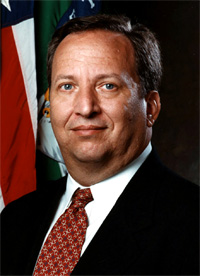
Larry Summers, former United States Secretary of the Treasury (from 1999-2001) made some interesting statements on bitcoin during the National Association for Business Economics Policy Conference to Politico’s Morning Money.
“I think Bitcoin has the potential to be a very, very important development,” he said, which would possibly come to the surprise of many in the digital currency community. “I think that we are seeing many, many sectors of our economy be transformed by information technology and certainly it seems bizarre that at this late date, one has to pay as much as one does to use a debit card or to get cash from an ATM or to transfer money to one’s child living abroad. So it seems to me that there’s going to be a concerted effort to reduce financial frictions and that effort’s going to be multi-faceted and certainly Bitcoin is an innovative approach in that regard.”
Summers continues (bold emphasis ours):
I am very mindful that there have been other things that came out of Silicon Valley that seemed very flakey to people on the outside and then proved to be an enormous deal. Very serious economists thought that the Internet was going to be no more important than the fax machine so I’m not willing to dismiss Bitcoin. At the same time, I do think it’s important to recognize that it can’t and won’t flourish as a way of avoiding legal protections.
He makes an interesting point, and it’s certainly refreshing to see a public official (albeit former) acknowledge technological innovation as opposed to remaining set and their ways with a dismissive attitude.
Not everyone holds the same opinion, however. Recently, J.P. Morgan CEO Jamie Dimon said bitcoin is a “terrible store of value”, and his company subsequently released a less-than-positive report on the digital currency, calling it “vastly inferior to fiat currencies”.